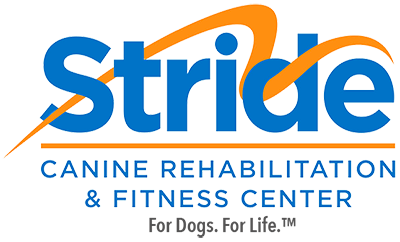When your dog is out of commission, sidelined, benched or otherwise finding themselves very, very, very bored due to activity restriction, know that all of us at Stride understand. We have all had to suffer along with our own dogs who have also found themselves in similar situations following injury or surgery. And boy do we know how incredibly challenging, even depressing, it can be to feel like “the bad guy.”
Activity restrictions are so much more than “activity restrictions.” There are substantial lifestyle changes that can seem stifling and frustrating for everyone. Potty breaks alone will redefine your daily routine. It is a fact that you will have to: be clothed enough not to alarm your neighbors, find BOTH slip on shoes before your first cup of coffee (they might not match), find a leash and then attach it to your dog (who may think that leashes mean a whole lot more than a potty break), and finally… physically wander around with your dog while they find just the right spot to do their business. Rain, Snow, Heat, Hail… For. The. Next. Eight(ish). Weeks. Yeah. It’s hard. And we know it’s hard. But it’s SO worth it. Because at that final recheck, when your attending veterinarian says everything looks perfect, you can be sure that adhering to activity restriction guidelines played a large role in your dog’s AMAZING recovery.
While it is not always an option to be (pre)prepared, if possible start implementing as many lifestyle modifications as you can before a surgical procedure happens. Warn your neighbors, set your coffee on a timer, buy multiple leashes (and then lose all of them), teach your dog that they actually CAN eliminate while tethered to you, introduce the idea of sleeping on the floor (to your spouse or partner) and inform your dog-park friends that you have not gone missing.
Here are some (totally legal) suggestions to make things a bit more tolerable.
1. Use a ramp: Teach your dog to safely navigate the use of a ramp and how to allow you to assist them into the vehicle if you need to lift them.
2. Address potential behavior challenges that might negatively affect healing or increase the likelihood of complications: Invest in a dog trainer who can help you teach your dog all the calm, cool and collected things such as:
- Loose leash walking
- Place or mat behavior
- Door bell reactions
- Other potential behavior challenges that might negatively impact healing
3. Multi dog households: If you have more than one dog (and who doesn’t), introduce the idea of separate walks/housing areas.
4. Pharmaceutical help: Talk to your veterinarian about the use of pharmaceutical medications to help promote calm(er) behavior. For your dog. It WILL help.
5. Housing and confinement:
- Introduce your dog to the “isolation” chamber – or area where your dog will be confined to for at least a few weeks.
- Block accessible windows with press’n seal plastic wrap so that your dog can’t obsess about squirrels, cats or other dogs walking by.
- Put all of your dog’s toys in a safety deposit box for safe keeping.
- Buy carpeted runners and design a racetrack on wood, tile or other slick surfaces.
- Invest in a baby gate to block access to stairs.
- Put a sign above your doorbell asking visitors to text you when they arrive.
6. Grooming: Get any necessary or unnecessary grooming done.
7. Muzzling: Familiarize your dog with a muzzle, if needed. Pain can cause even the sweetest dog to behave like your in-laws might at a family BBQ.
8. Human communication and expectations: Draw up a non-binding contract with each member of your household, in which they agree to reduce the amount of treats they give and to follow the instructions for activity restrictions.
The simple fact is that activity restrictions are hard. Changes in routine are hard. But most of the time, if you trust the process, and you can manage to keep the leash short and your patience long, just for a few weeks, you’ll have successfully navigated something that may have seemed impossible when you started the journey. Plus, if you need someone to vent your frustrations to, you can ALWAYS confide in us. No judgement. Just support.

